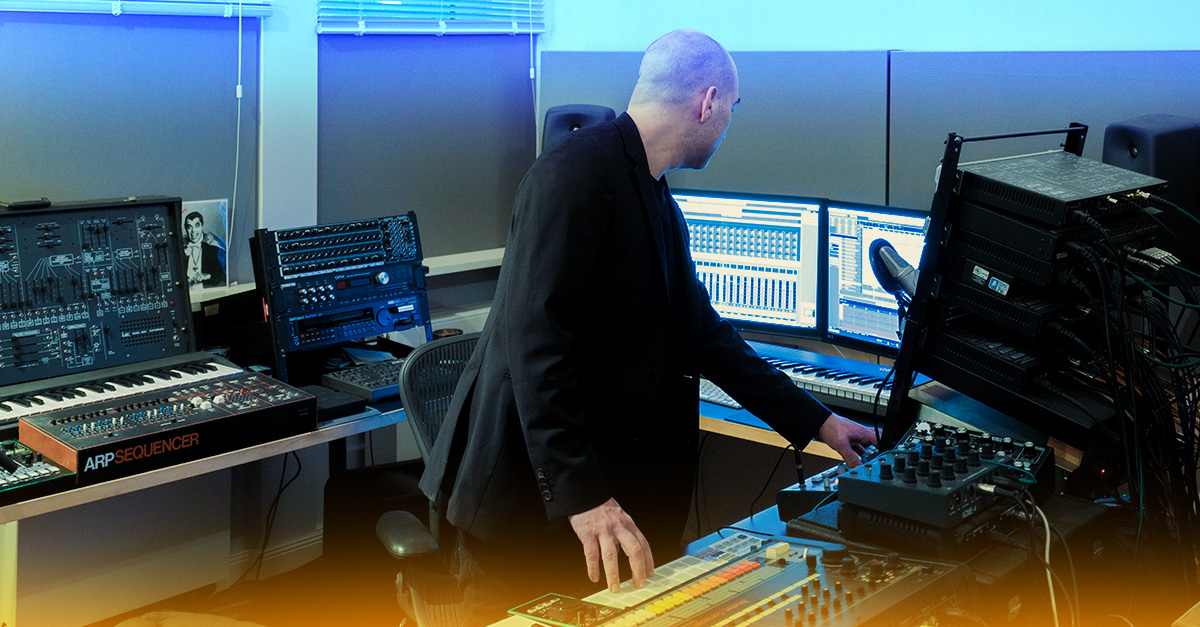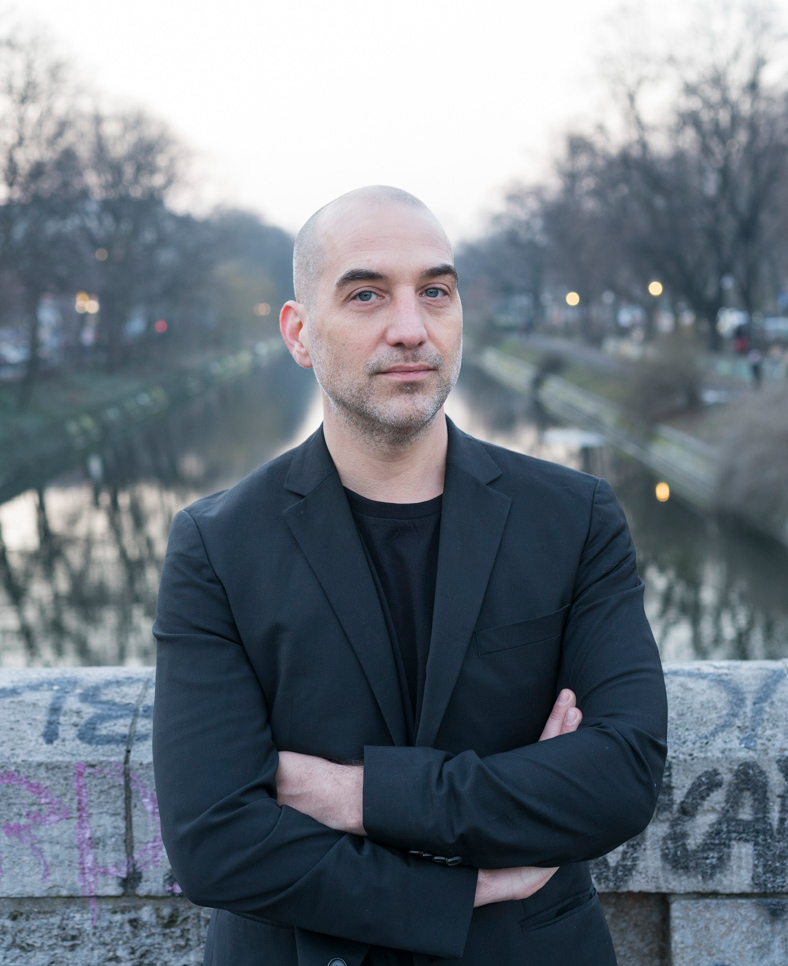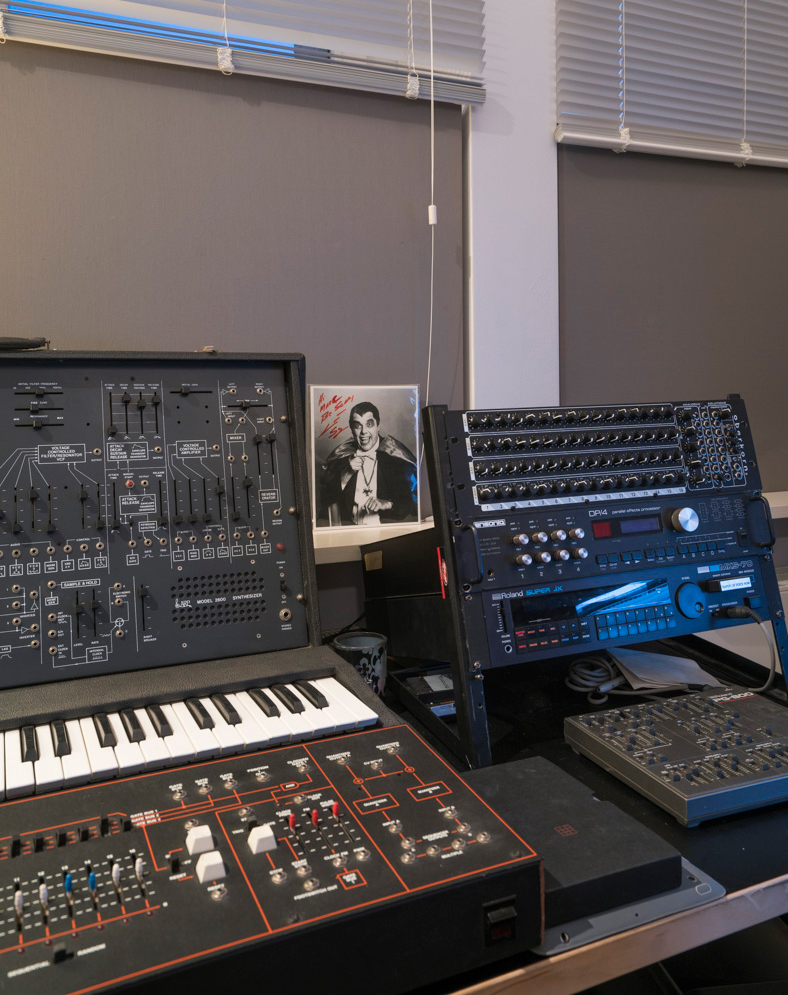Marc Houle: Know Every Sound You Can Make

Canadian producer Marc Houle has seen dance music progress through more than a decade of changes. Along the way, Houle has built an influential catalog including classic releases on labels Minus and Items & Things.
We caught up with Houle (and his dog) to discuss his current studio and live setups, the enduring importance of albums in the digital distribution landscape and the influences he lets into his process.
Your newest project is a 3-part album series. Could you talk about some of the reasons for doing such a sprawling project?
Initially I set out to make one album. I started recording a bunch of songs because I wanted to start fresh. But after ten or fifteen songs I realized “wait a minute, there are three different styles here, which ones am I gonna use for the album?” I just kept working, and never really stopped. The tracks kept being three different styles.
In the end, I decided to do three separate releases for this. Since they were all getting done simultaneously, I decided I should release them all at the same time because then you can hear which three directions are part of my style or the parts of my persona.
The first one is a weird, dark, moody kind of thing. The second one is a synthy album, a lot of what I love, like melodies and focusing on the sounds of my gear. Then the third one is gonna be a techno thing for people to play and dance to. Party music—what I’m kind of more known for, I guess.
Does releasing 3 albums at once put more pressure on the process?
It’s tough. Now that I’m putting so much focus on them, they have to be the best. When I released albums before I used to think “OK, there’s a couple of good songs on here, the rest will carry it. Then there’s a couple of weird ones and that’s good.”
Now that I’m defining the album so much more, every track has to fit the mold. Before, it never had to, so it’s a bit difficult. But it’s a good challenge because it forces me to delve into those personalities more.
How important are sites like Beatport for a project like this?
Sites like Beatport have given birth to a billion more DJs than there probably would’ve been without them. That’s a good thing because more people are getting involved in the music, creating different styles and pushing the scene forward. But yeah, dance music needed it and it showed up to fill the void.



What do you think about the relationship between, the single versus the whole album in the current moment of electronic music that we’re in?
As a dance music veteran, I love albums. It says so much more than a song. So many times you hear a song, like let’s say “White Horse.” Y’know, “If you wanna ride/ride the white horse,” that song.
I ended up getting the whole album because I loved that one song. I listened to the rest of the album and it was nothing like that song. What’s going on? It was kind of disappointing and I didn’t latch onto that band so much but when there’s like a… let’s say… Japan or something, “Gentlemen Take Polaroids,” it’s such a great album that it becomes part of…I don’t know, it just hits me more. Wait, I don’t know how to say this right.
I think I’m following…
Yeah, but how do I say it? I guess it becomes more substantial. The album is a whole…it’s a movement instead of just a piece.
That’s a good way to frame it.
While I’m doing this interview, I’m throwing the ball to my dog—Keeps my body busy, so my mind can focus.
That’s how all interviews should be done! So what were you saying about being in a weird time for singles…
Well for example, when I’m having people over to the house, I used to put an album on… I’d put on, let’s say, Kraftwerk “Computer World,” and we’d listen to the whole thing: A side, and B. People would just sit around and talk. Now, you put on Spotify, Apple Music, or something and you put on a playlist, or you put it on a radio thing, and it’s just chaos, you know?
It is, yeah.
The mood is going all over the place and people are running to put on the next song saying, “Oh, I’m gonna play this, I wanna play this.” I guess it makes it more exciting, and it makes it more dynamic because people are involved instead of just sitting back and relaxing.
But, is it almost too much?
You don’t accomplish the same thing at the end of the night. Maybe you don’t walk away feeling moved, as you would have before, I guess. It’s all temporary.
Yeah, unless you take the time to unpack every single song right? You’re not going to go back and listen to every full record even though they’re all available to us.
Yeah, it’s easier to forget if you hear a cool song. It can get washed away by a different genre and a different style. It’s like your brain forgets what it just heard three minutes ago. It’s so temporary, whereas, if you listen to an album, the sounds reinforce themselves. After a while, the emotions stay, and the feelings stay, and there’s more permanence. Of course there’s pros and cons to both ways of listening. It’s just unfortunate that no one’s doing the album thing anymore. Why would they?
It’s like your brain forgets what it just heard three minutes ago. It’s so temporary, whereas, if you listen to an album, the sounds reinforce themselves.
How does an album project like this translate into the live environment?
My live versions are much louder, noisier. There are way more drums going on. There’s way more energy because if I’m sitting on a plane listening to one of my songs and it’s going [boom, boom, boom], and there’s reverbs and distortions and delays, I think, “Ugh, this sucks.” I go insane and shut it off.
But, if I’m on stage and I’m playing a really quiet song, very moody and bassy, people just kind of…bob their heads and not dance, you know? So, you kind of have to jack it up a bit when you’re playing live.
There’s so much noise in a club that you need something bigger than the initial noise. I mean, some DJs can just sit and play mellow and quiet, but I don’t know. I need energy, I need party, I need…yeah, party.
You’ve talked before about people always wanting to talk about techno or new music with you, but they forget about the importance of new wave or punk or even more mainstream music, that idea really resonated with me.
It happens a lot. Like today even, my friend was over and we had some new wave music playing. I had to stop it a couple of times because something would be playing and I’d say, “Hey, that’s a cool clap, I have to remember that.”
You can find notes in there. Maybe an old country song and it has some weird snapping with a spring reverb from the 50s and you’re thinking, “Whoa, that’s so moody. It’s so cool. I wanna experiment with that.”
So, even if it’s the ‘crappiest’ music…like some top 40 stuff playing at the mall, you can still hear something cool—maybe the way a bassline transitions into a different bassline, or certain arrangements and things like that. It makes listening to music fun, no matter what the music is if you analyze it.

I just kept working, and never really stopped.

So would you go in and grab that snap or that reverb and sample it?
No, no, no. I’m far too lazy to download a song and sample it. It’s easier to just do something…similar, but in Marc’s style.
I’ll just snap with the spring reverb on. It’s much faster than downloading “King of the Road,” and cutting and pasting stuff.
In what ways do you think technology has pushed dance music forward? Are we still innovating?
Oh, yeah. People have been asking this question since the whole thing started. It’s always going forward. It’s always going faster than you think it is.
If you just look back at the old ways to do stuff, the old albums were made with a cassette deck in your parents’ house with one keyboard and one drum machine. That’s how most original dance albums were made!
Now it’s just insane. Every kid has access to every compressor ever made. It’s insanity. The possibilities are endless. Before, you would go to a pawnshop, see what synths they had available. “Oh, you’re selling that synth? Okay. Cool,” and you’d go make three albums with that one synth.
Do you think that approach to creating is more important now than ever before?
Yeah, because you only had the one synth, so you’d master it. You knew every single button on it, every sound it could make and that was kind of cool. Now you just open up any DAW and just cycle through a million sounds. I guess you don’t become a specialist in sound design like you used to have to.
It was cool then. You had the sound in your head first, and then you would create it and add it to the track. Now, you don’t know what sound you want yet, so you cycle through a million presets looking for a sound that you like and it’s a different way to do things.
I like walking in the studio, looking around at my synths and thinking, “Okay. I need something to cut through the midrange, so I guess I’ll turn on my DX7 or the Mono/Poly because it’s perfect for that midrange sound.” I mean, one way isn’t better than the other, but it’s just completely different now.
Yeah there’s certainly some new and distinct ways to create now.
There’s a way different way to do everything now. It’s cool because you can choose your own path. You have more paths to choose from, you know?
Yeah, for sure, but with all these tools it’s hard to know when a project is actually finished. Do you have a method for deciding when something is done?
I’ll sit there, and think, “Okay, these are great songs for an album. This is a great album. Perfect.” I’ll put it in a folder to listen to and give it a couple of days. Then I go back and listen to it because it takes me a couple of days to erase my preconceptions of it and listen fresh. Most of the time I end up saying, “What? What’s this song doing here? It sucks,” so I replace it, rearrange everything and then leave it for another couple days, go back with fresh ears again and realize that a different song sucks now. But eventually, when I go back to it and think, “Hey, everything’s good now,” then it’s done.
That seems like a pretty good process, your own best critic…
I also bring someone else in and let them listen to it with me in the room. For some reason, when someone else is in the room, I listen through their ears and can imagine what they’re thinking. You hear mistakes in your tracks that you wouldn’t have heard if it was just you by yourself.
You can feel if a part is going on way too long because you feel bad for this person listening. I take note of all those things, and then go back and cut stuff up or change some sounds. It helps a lot. It’s a weird phenomenon that seems to work for me.
… you only had the one synth, so you’d master it. You knew every single button on it, you know every sound it could make.


https://www.youtube.com/watch?v=af48Nbfsm9Y
Tell me about growing up in Windsor and Detroit and how you progressed to where you are now.
In Windsor it was mostly rock bands and stuff when I was growing up in the 90s, so the first thing I did was get a drum kit and join a rock band. I was also playing 80s synthesizer music. My sister got me into Depeche Mode and Kraftwerk and stuff, so I’d get a little radio and just record my Casio for months and months.
When I got older, I found out about the whole Detroit techno scene. My friends started going to these techno parties, and I would go with them. All of a sudden I found out, “holy shit, this is the best of both my worlds.” It’s all the drums and rhythm stuff that I love and play, but it’s also synths and electronic stuff. I never even knew that sound existed. On the radio we’d hear electronic stuff but not a pure techno beat going on for six hours straight.
As soon as I went to Detroit and heard that music I knew it was me. I started getting more keyboards and drum machines so I could replicate what I was hearing and just having fun making new stuff and never really stopped.
And you were going as much as you could?
Yeah, we all had cars. In Windsor, we’re five minutes away from downtown Detroit, so we’d decide “hey, let’s just go across” and five minutes later we’re at a party.
Every Thursday, Friday, Saturday, Sunday, we’d just hit all the different underground parties, warehouse parties, and we just went crazy. It was like a playground for ten years.
But we were never thinking “this is something special! It’s Detroit! It’s different than the rest of the world. We were just thinking “oh this is fun. I’m sure everywhere is like this.”

That must have been pretty formative.
It was incredible. The parties that I went to… I’ve never seen anything like it anywhere in the world since.
What brought you to Berlin? How did you make that transition?
When I was still in Canada, I had released an album on Minus, and Rich [Hawtin] asked me “Hey, Marc, do you wanna come play a show at the Beat Street Party in Berlin?” I’m like, “What? Are you gonna pay for the flight?” He said, “of course” but my next question was “how do I play live?” I’d only been a studio guy.
Rich had…the new Korg USB thing that had just come out. It was probably like 2004. He said “Here, take this keyboard. Take this program. It’s called Ableton. It just came out. It’s really good. Just put the songs you make in Ableton. Cut it up into pieces, use this keyboard thing and just map everything and go.”
I went back for two months and figured out how to do a live set with delays, reverbs and all this cutting up stuff. Eventually I played the party and it was super crazy.
In Detroit, everyone just dances in a dark room for eight hours but in Berlin everyone is going “Yaaaaaay” and hanging from the ceilings and yelling. I was thinking “what the hell? what’s going on here? I’m so confused. This is insane. It’s so different.”
So it started with a few gigs?
After the party Rich said “Hey, Marc if you wanna play some more shows, we can get you more gigs in Europe.”
I called back to Canada, and said, “Hey, I’m not coming home.” I’ve been touring ever since…
By the way, my dog’s been running this whole time.
Interviews must be good exercise for your dog.
I have to do this because then I can go in the studio and work. If she’s not tired out, she’ll bother me to take her out and play some more. This way, she’s just gonna go and sleep while I work on music.
She probably hates techno, so she’s trying to get me to stop making it.
Maybe she’s thinking “Marc, you always talk about new wave. Why don’t you make some rock and roll again?”
Yeah, right?
I called back to Canada, and said, “Hey, I’m not coming home.” I’ve been touring ever since…
Marc Houle Borrowed Gear — 2004